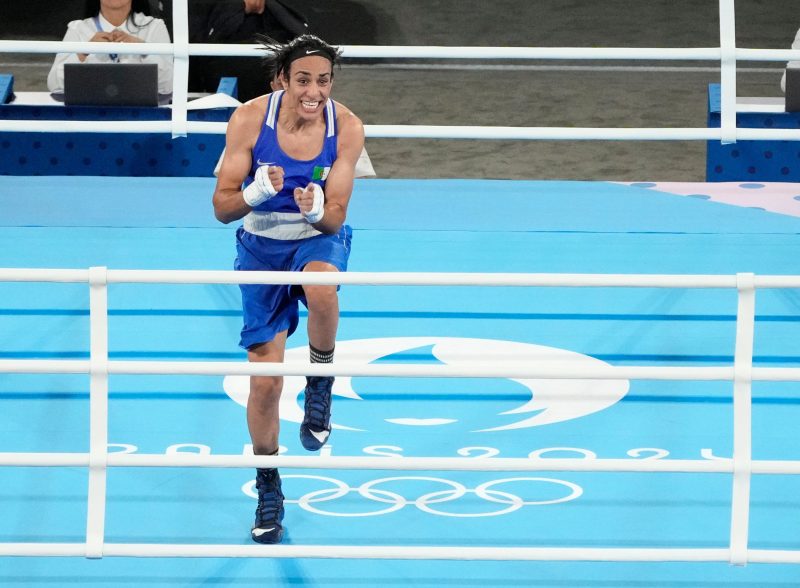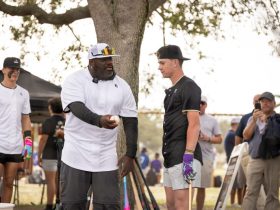PARIS — The only relevant issue that remains unresolved in the week-long brouhaha around Algerian boxer Imane Khelif is whether she will go home with a gold medal Friday night.
Every other player in this story has had their say, and so now it’s time for a full accounting of where everybody stands.
The Algerian people? They’re with Khelif. They showed up by the thousands for her semifinal bout Tuesday night. They roared to the rafters when she entered the ring against Thailand’s Janjaem Suwannapheng, and they shook their green-and-white flags when she landed a right-handed blow in the third round that put an exclamation point on her victory.
The International Boxing Association? After shaking up these Olympics with accusations that Khelif failed a “sex test” at its 2023 world championships, the IBA’s clownish news conference here Monday served only to make its leadership – and particularly its Russian leader Umar Kremlev – look incompetent, vindictive and corrupt. Any relevance the IBA had in the world of amateur boxing has been pushed further to the fringes.
The International Olympic Committee? It’s been steadfast in refusing to give the IBA and its accusations even a millimeter of credibility as they pertain to what is happening with these Olympics. Khelif was eligible to compete here under IOC rules, any IBA testing is irrelevant to that reality, and backtracking on that in any way would open a Pandora’s box to an Olympics where women are being hauled into doctor’s offices because their competitors think they look too much like a man.
The online rage mob? They thought, when Khelif connected with a vicious punch to her first-round opponent’s face, that they finally had the thing they’ve been warning about: A man pretending to be a woman inflicting physical harm to a real woman in a sporting event. When it became clear that every bit of evidence in Khelif’s life and backstory points to her being born a woman, they shifted their obsession to chromosomes and hormones. Five minutes after these Olympics end, they will forget about Khelif and assuredly move on to something else.
And Khelif? As difficult emotionally as the last few days likely have been, she appears to have moved on, too. This time, there was no crying. She celebrated her Tuesday victory with smiles and fist pumps. She stopped in the media zone and answered a few questions in Arabic. Though the translations were a bit sketchy, she purportedly said that she did not care about the controversy. The net effect of all this, regardless of whether she wins gold or silver, is that she is going to return as one of the most famous and beloved athletes in the Arab world.
“I am very happy,” she said, according to the official transcript. “I’ve worked eight years for these Olympics, and I am very proud of this moment. I would like to thank the support from people back home.”
And that’s going to be where the story ends.
Get Olympics updates in your texts! Join USA TODAY Sports’ WhatsApp Channel
In 2028, boxing is either going to be cut from the Olympics or a new federation like World Boxing is going to be in charge. To the extent that any of the people making these politically-motivated attacks on Khelif will care or remember, there will be some interest in whether the new governing body institutes some rules on women with differences in sex development (DSDs) and establish thresholds on testosterone levels that would allow them to compete.
That’s a debate World Boxing or some other organization will have to have, and it will undoubtedly face immense pressure to do so given the dialogue around Khelif.
To be clear, we do not know whether Khelif or any other boxer in this tournament has a DSD, and it’s unfair to assume so based on how she looks or how she fights. One of the most disheartening things about this entire story is how many people are making full-throated assumptions about a person and a topic they don’t know much about.
For instance, a promotional video that shows Khelif in some intense training sessions started popping up on social media the last couple days with comments from people saying that it proves she’s a man. No, it proves she’s a boxer.
She trains the way a boxer trains. She looks the way a boxer looks. She is in a sport where people hit each other in the head. If you took 15 minutes to watch other fights, there is not any visual difference in the way she fights as opposed to her peers.
That’s why, until now, Khelif was not considered some overwhelming force in the welterweight division. She was just a pretty good and improving boxer who lost a whole bunch of fights before the wins started to come. There wasn’t any controversy around her participation until last year when the IBA disqualified her from its world championships.
About that: At its news conference Monday, the IBA was asked repeatedly about the circumstances of those tests. It offered no answers that made any sense. At one point, Kremlev ranted in Russian and got so spun up that he said Khelif had the testosterone levels of a man. But the IBA’s own statement last week said that Khelif wasn’t tested for testosterone but rather a “separate and recognized test.”
The IBA also claims that it tested Khelif the first time in 2022 on the basis of other coaches and boxers complaining about her, but that the result was inconclusive.
It begs two questions: Why did the Kremlin-backed IBA wait 10 months to test her again and let her enter the next world championships, only to disqualify her with no due process after she had beaten a previously unbeaten Russian boxer named Azalia Amineva? If the IBA wanted to be taken seriously as a credible source, it should have had an answer to both of those issues. It didn’t.
A lot of people who have gotten interested in this story have then asked, OK, so if there was some question about the Russian tests, why not re-test under the IOC?
The reason is simple: The IOC either has a process, or it has chaos. When an Olympic cycle begins, every athlete in every sport knows the rules to qualify. Whether you think it’s right or wrong, and regardless of whether it might change in the future, this particular kind of testing was not necessary for Khelif to be eligible for the Paris Olympics.
To change that policy on the fly, or to single out an athlete because some organization that is irrelevant to the Olympics dropped a lab report on its doorstep, would have far-reaching unintended consequences. If the IOC allowed that, it would be inviting challenges to all kinds of athletes on all kinds of illegitimate grounds who find themselves having to prove things about themselves that have never before been in question as they try to qualify for an Olympics.
The IOC doesn’t merely have a moral imperative to stand behind Khelif in these circumstances, it has a duty to protect its process.
And that’s basically that. The saga with Khelif has reached a dead end. There are some questions we’ll never get answers to, and the people who are still convinced she’s a man will never see it another way.
But on Friday, after all this, Khelif has a chance to leave Paris as a gold medal winner and a superstar who won’t have to answer any more questions about this witch hunt for the rest of her life.
Follow Dan Wolken on social media @DanWolken
The USA TODAY app gets you to the heart of the news — fast. Download for award-winning coverage, crosswords, audio storytelling, the eNewspaper and more.








